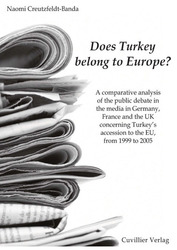| Departments | |
|---|---|
| Book Series (96) |
1381
|
| Nachhaltigkeit |
3
|
| Gesundheitswesen |
1
|
| Humanities |
2370
|
| Medienwissenschaften | 16 |
| Theology | 57 |
| Philosophy | 102 |
| Law | 424 |
| Economics | 851 |
| Social sciences | 418 |
| Sports science | 48 |
| Psychology | 233 |
| Educational science | 190 |
| History | 183 |
| Art | 111 |
| Cultural studies | 166 |
| Literary studies | 117 |
| Linguistics | 88 |
| Natural Sciences |
5408
|
| Engineering |
1795
|
| Common |
98
|
|
Leitlinien Unfallchirurgie
5. Auflage bestellen |
|
Advanced Search
Does Turkey belong to Europe? (English shop)
A comparative analysis of the public debate in the media in Germany, France and the UK
Naomi Creutzfeldt-Banda (Author)Preview
Table of Contents, Datei (46 KB)
Extract, Datei (63 KB)
My thesis, entitled ‘Does Turkey belong to Europe? A comparative analysis of the public debate in the media in Germany, France and the UK concerning Turkey’s accession to the EU, from 1999 to 2005’ focused on the issue of whether a European public sphere as manifested in the media of three countries – the UK, Germany, and France exists or is emerging. The formation or lack of formation of a European public sphere was analyzed as a function of identity and values at national and European levels that emerged in a public debate about the accession of Turkey to the EU. The main question of the thesis was whether the accession of Turkey could teach us anything about how national identity and European identity interact on a theme common to all member states. I discussed how for the first time in EU history, it was not the official representatives who decide on the accession but rather the EU decided to leave the decision to the individual states. In other words, the accession of Turkey would depend on referenda in member states. Hence, the national identity was allowed to dominate over a European identity. I examined public attitudes in the three member states towards the EU with the aid of Eurobarometer findings and opinion pieces in national media. Each of the three states differed. Nevertheless, despite the differences, a public debate emerged in terms which overrode these differences. Issues that concerned all of the member states were reported throughout the Union at the same time and at the same level of importance. For example, while there was a correlation between differences and attitudes towards the accession of Turkey, the questions which were raised were the same in the three states. These questions focused on what values underlie identity. If the values attached to a national identity converge then identities too can converge. My research showed that the values more often articulated in the public press related to common religious and historical roots, a common political evolution into democracy, a common abhorrence to war, and a common economic transformation into a welfare state. My thesis compared the convergence of national identities into a European identity on certain specific issues, thereby creating a European public sphere. National identities tend to converge when then citizens in the European regional block compare themselves to American block. This was made clear in the widespread demonstrations in Europe against the American aggression in Iraq. The conclusions were that a European public sphere does not exist, thus, the examined public itself constitutes a sphere where it talks as a European public, finding a common denominator only in matters concerning the EU as a whole (e.g. the community of values debate), whereas for most matters this public seems to keep a foot in more than one sphere – national and European (e.g. the European identity debate). As a result, this public is artificially created as a mixture of spheres and information that is easily manipulated by the media.
| ISBN-13 (Printausgabe) | 3867279667 |
| ISBN-13 (Hard Copy) | 9783867279666 |
| ISBN-13 (eBook) | 9783736929661 |
| Language | English |
| Page Number | 254 |
| Edition | 1 Aufl. |
| Volume | 0 |
| Publication Place | Göttingen |
| Place of Dissertation | Universität Göttingen |
| Publication Date | 2009-07-31 |
| General Categorization | Dissertation |
| Departments |
Social sciences
|
| Keywords | artificial public,European public sphere, National public sphere |








